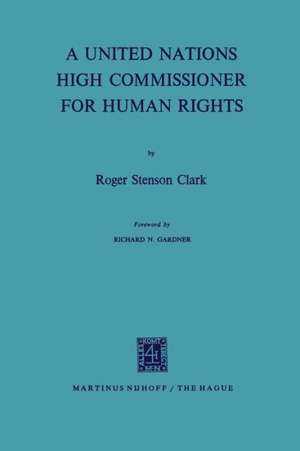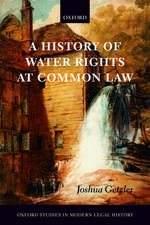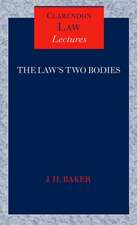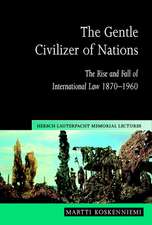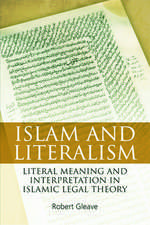A United Nations High Commissioner for Human Rights
Autor Roger Stenson Clarken Limba Engleză Paperback – 1972
Preț: 382.75 lei
Nou
Puncte Express: 574
Preț estimativ în valută:
73.24€ • 76.62$ • 60.84£
73.24€ • 76.62$ • 60.84£
Carte tipărită la comandă
Livrare economică 03-17 aprilie
Preluare comenzi: 021 569.72.76
Specificații
ISBN-13: 9789401181631
ISBN-10: 9401181632
Pagini: 204
Ilustrații: 186 p. 1 illus.
Dimensiuni: 155 x 235 x 11 mm
Greutate: 0.29 kg
Ediția:1972
Editura: SPRINGER NETHERLANDS
Colecția Springer
Locul publicării:Dordrecht, Netherlands
ISBN-10: 9401181632
Pagini: 204
Ilustrații: 186 p. 1 illus.
Dimensiuni: 155 x 235 x 11 mm
Greutate: 0.29 kg
Ediția:1972
Editura: SPRINGER NETHERLANDS
Colecția Springer
Locul publicării:Dordrecht, Netherlands
Public țintă
ResearchCuprins
1 International Human Rights Activity.- A. Prior to the United Nations.- B. The United Nations and Human Rights.- C. Achievements of the United Nations.- D. NGOS and Human Rights at the United Nations.- E. The Nature of the Problem.- 2 The Development of the High Commissioner Proposal.- The Cassin proposals.- The United Nations High Commissioner for Refugees.- The proposals of the Consultative Council of Jewish Organizations and of Uruguay.- Revival.- The Costa Rica draft in the works.- The Working Group’s draft.- The Commission on Human Rights approves.- ECOSOC approves.- In the Assembly.- 3 The Functions of the High Commissioner.- Subject matter.- Analogy with an Ombudsman.- General duty to assist in promoting and encouraging.- Subparagraph (a): advice and assistance to UN organs.- Subparagraph (b): assistance and services to states.- Subparagraph (c): communications.- Subparagraph (d): reporting.- A wider view of subparagraph (d): a “good offices” function.- Some general considerations.- The exhaustion of domestic remedies.- Discretion versus publicity in the High Commissioner’s operations.- The prospects for evolution.- 4 Some Administrative Matters and the Issue of Collegiality.- Appointment and financing.- Relations with the Secretary-General.- Relationship with implementation organs.- The panel of expert consultants.- 5 The Constitutionality of the Office, Particularly in the Light of Article 2, Paragraph 7 of the Charter.- A. Article 2, Paragraph 7 of the Charter.- B. The Argument that the Charter Requires a Collegiate Body and not an Individual.- C. The Argument that Individuals can not be Subjects of International Law.- 6 The High Commissioner as a Law Promotor Rather Than a Law Enforcer.- The High Commissioner as part of a political process.- The HighCommissioner as a catalyst for the creation of international customary law.- A promotor, not an enforcer or protector.- 7 Conclusions.- The High Commissioner would not be a mere stop-gap.- An unwelcome proliferation?.- Why not leave the job to the Secretary-General?.- The implications of the proposal for international organization.- The advantages.- What the future holds.- Appendix I Resolution Adopted by the Economic and Social Council at Its 1479th Plenary Meeting on 6 June 1967 (Question concerning the implementation of human rights through a United Nations High Commissioner for Human Rights or some other appropriate international machinery).- Appendix II United Republic of Tanzania: Amendments to Draft Resolution IV Approved by the Commission on Human Rights at Its Twenty-Third Session on the Question Concerning the Implementation of Human Rights through a United Nations High Commissioner for Human Rights or Some Other Appropriate International Machinery.- Appendix III Outline of Headings Sent to States by the Secretary-General When Inviting Reports on Civil and Political Rights for the Period 1 July 1965 to 30 June 1968.
